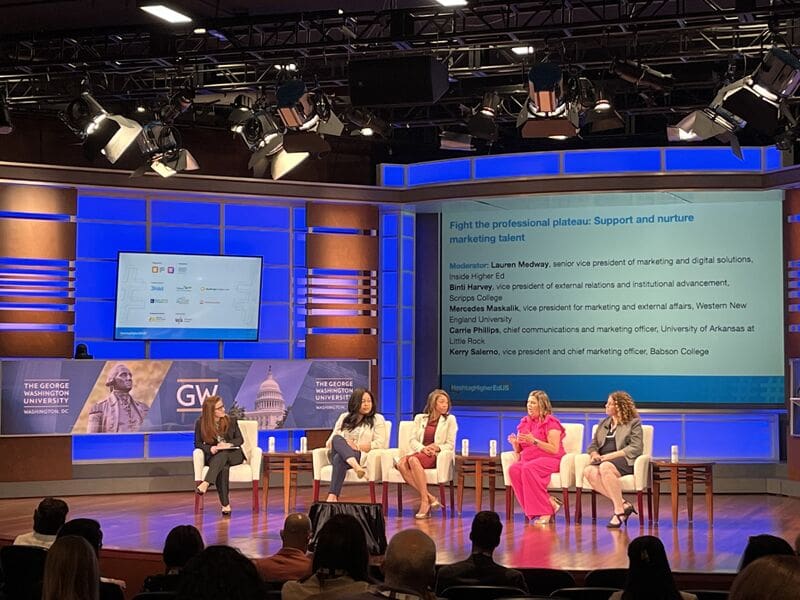Phillips Joins Panel to Combat Professional Plateau and Foster Communications and Marketing Talent

In an effort to address the challenges faced by communication and marketing teams in higher education, Dr. Carrie Phillips, chief marketing and communications officer at UA Little Rock, has lent her expertise in a panel discussion at the HashtagHigherEd US Conference.
HashtagHigherEd US is a dedicated forum for higher education marketing and communications professionals to come together and share best practices in communication, marketing, and branding strategies in a crowded and dynamic landscape. Held in partnership with Times Higher Education, the HashtagHigherEd US Conference was held June 1-2 at the George Washington University School of Media and Public Affairs in Washington, D.C.
Phillips served as a panelist in the June 2 panel entitled, “Fight the professional plateau: Support and nurture marketing talent.” Lauren Medway, senior vice president of marketing and digital solutions at Inside Higher Ed, moderated the panel featuring chief marketing and communications officers from across the country discussing industry challenges.
With many talented and creative marketing managers feeling the pressure to leave higher education to advance their careers, the session took a closer look at how to manage, nurture, and retain talent as well as create growth opportunities for skillful marketing managers.
“Participating in this conference helped me continue to grow and be a better leader,” Phillips said. “It also helps build a pipeline for future industry leaders. We need more people who want to be a part of the marketing and communications industry in higher education.”
Phillips was joined by fellow panelists Binti Harvey, vice president of external relations and institutional advancement at Scripps College, Kerry Salerno, chief marketing and communications officer at Babson College, and Mercedes Maskalik, vice president for marketing and external affairs at Western New England University.
With years of experience and a wealth of knowledge, Phillips aimed to shed light on the strategies and initiatives needed to propel marketing talent to new heights and overcome stagnation in the ever-evolving landscape of communication and marketing.
“We talked about the work that we do as chief marketing and communications leaders to create winning scenarios for our teams,” Phillips said. “With the ongoing Great Resignation, we discussed how we engage people on our teams to keep them excited about the work that we are doing.”
One of the strategies that Phillips discussed is creating a culture of continuous improvement and assessment for her team. She emphasizes professional development on her team with each employee creating a strategic plan to map their professional development goals. She also uses the start-stop-continue exercise to assess workplace strategies. It’s a retrospective exercise that increases efficiency by helping teams decide what they’re going to start doing, stop doing, and continue doing to increase workplace productivity.
Additionally, Phillips enjoyed getting to discuss the career challenges she faces with a group of women leaders.
“I really enjoyed the opportunity to be in a room with other chief marketing and communications officers to talk about the challenges we are facing, how talent management is important, and building collaboration on campus, all the things that keep me up at night,” she said. “Hearing people having the same challenges is reaffirming that we are all in this together, and that there is a team of people that we can turn to and utilize as resources.”
Phillips said her favorite session of the panel was with Scott Jaschik, editor and co-founder of Inside Higher Ed, who spoke about communication in an unpredictable political landscape.
“Being in the nation’s capital, we were able to have these overarching conversations about the intersection of politics and higher education and how that can play into our work,” she said. “Scott Jaschik presented some fascinating information on this subject. It helped me think about how we can better tell our story. We are doing some great incredible things at UA Little Rock, and we need to work hard to continue to tell our story.”
